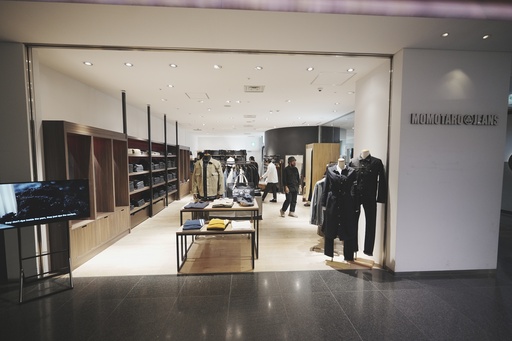
In the town of Kojima, Japan, denim is a significant part of the local culture, with Jeans Street as the main road where real pairs of jeans are displayed overhead. This area in Okayama Prefecture is considered a jeans mecca, attracting fans worldwide. With about 40 jeans manufacturers and stores, including denim-themed cafes, Kojima receives approximately 100,000 visitors annually, according to the Japan National Tourism Organization.
Japanese jeans from Kojima are known for being high-end, dark, and durable, with a reputation for craftsmanship. Brands like Big John, originating in the 1940s, have become popular and supply international fashion labels such as Gucci. The Japanese denim industry focuses on connoisseurship and collecting as opposed to mass marketing, as noted by Emma McClendon, an assistant professor of fashion studies at St. John’s University in New York.
In Kojima, the emphasis is on “monozukuri,” or “making things,” reflecting a meticulous attention to detail and craftsmanship. The region’s companies are relatively small, with around 100 employees each, maintaining a pride in traditional Japanese work ethic. Workers like dyeing craftsman Yoshiharu Okamoto at Momotaro Jeans are dedicated to their craft, ensuring quality through laborious processes.
Kojima denim, often referred to as “Japan blue,” is distinct for its dark indigo hue and exceptional quality, but it comes at a price. Jeans from Kojima range from 33,000 yen ($230) to over 200,000 yen ($1,400) for top artisanal pieces. Japanese brands prioritize “raw denim,” promoting longevity and sustainability in response to fast fashion trends.
Companies like Momotaro Jeans offer a lifetime warranty, emphasizing repair and quality. Japan Blue Co., which owns Momotaro, reported significant sales both domestically and internationally. The region’s industrial history, rooted in sewing heavy fabrics and indigo dyeing, contributes to the lasting quality of Kojima denim, embodying a testament to a wearer’s life.
Craftsmen like loom specialist Shigeru Uchida and sewing machine operator Naomi Takebayashi play a crucial role in preserving traditional skills. The industrial heritage of Kojima, known for producing military clothing and kimono obi sashes, shapes the production methods and quality of the denim crafted in the region. Japan Blue’s president, Masataka Suzuki, envisions denim as a symbol of a person’s journey, evolving and aging with the wearer.
